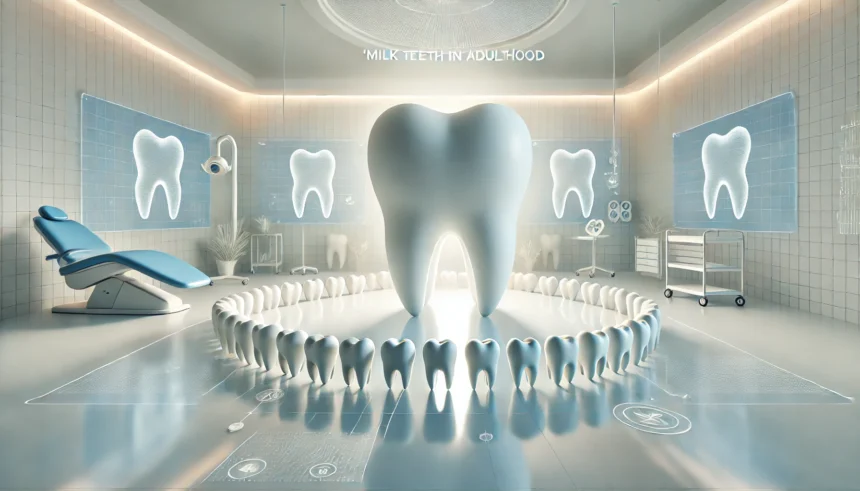Milk teeth, also known as primary or deciduous teeth, are the first set of teeth that children develop. These teeth usually begin to appear around the age of 6 months and start to fall out around 6 years old, making way for permanent adult teeth. However, in some rare cases, milk teeth can persist into adulthood. This phenomenon, known as milk teeth in adulthood, can lead to several dental issues, such as misalignment, decay, and difficulty maintaining oral hygiene. In this article, we’ll explore the causes of milk teeth in adulthood, the potential health implications, and available treatment options.
What Are Milk Teeth?
Milk teeth are the first set of teeth that children develop. They serve essential functions, helping children chew and speak as they grow. Typically, these teeth start emerging around the age of 6 months and are expected to fall out between 6 and 12 years old. During this time, permanent adult teeth gradually grow in to replace them.
There are typically 20 milk teeth—10 in the upper jaw and 10 in the lower jaw. These teeth are smaller and whiter than permanent teeth and are essential in guiding the adult teeth into their correct positions.
Causes of Milk Teeth Retaining in Adulthood
In most cases, milk teeth shed naturally to make room for permanent teeth. However, some individuals may experience persistent milk teeth into adulthood due to a variety of causes:
- Delayed Loss of Milk Teeth: Sometimes, milk teeth remain in place longer than expected, even as permanent teeth are ready to emerge. This could be due to a delayed eruption of the permanent teeth beneath the milk teeth.
- Genetics: In some cases, genetics may play a role in the retention of milk teeth. Family history can impact the timing of tooth eruption and loss.
- Developmental Anomalies: Certain developmental conditions may cause the permanent teeth to fail to emerge or cause milk teeth to remain firmly in place. This can result in a mixture of primary and permanent teeth.
- Supernumerary Teeth: Some people may develop extra teeth that resemble milk teeth, leading to confusion about whether a milk tooth has been replaced.
Health Implications of Retained Milk Teeth
If milk teeth remain in adulthood, they can lead to several potential dental problems, including:
- Misalignment and Bite Issues: Retained milk teeth can interfere with the proper alignment of permanent teeth. This can cause bite issues, such as overbite or underbite, and might even require orthodontic treatment.
- Tooth Decay and Gum Problems: Like any tooth, milk teeth can decay over time, especially if they aren’t properly maintained. Since they are smaller and weaker than permanent teeth, they are more susceptible to cavities and gum infections.
- Impact on Oral Hygiene: Having milk teeth in adulthood can make it more challenging to maintain good oral hygiene. The presence of these teeth may make cleaning more difficult, leading to plaque buildup and increased risk of tooth decay.
- Speech and Chewing Functions: If milk teeth cause misalignment, they can also affect your ability to speak clearly or chew properly. This may lead to issues with eating or communication.
Diagnosing Milk Teeth in Adulthood
A dentist can identify whether milk teeth have persisted into adulthood during a regular dental examination. X-rays are typically used to determine if permanent teeth are present but have failed to erupt. These diagnostic tools help the dentist assess the cause of the problem and the best course of action.
Treatment Options for Milk Teeth in Adulthood
If you have milk teeth that have persisted into adulthood, there are several treatment options available:
- Extraction of Retained Milk Teeth: The most common treatment for persistent milk teeth is extraction. A dentist may recommend removing the milk teeth to make space for permanent teeth or to prevent decay or misalignment.
- Braces and Orthodontics: If retained milk teeth have caused misalignment, braces or other orthodontic treatments may be necessary to straighten the teeth and ensure proper bite alignment.
- Dental Implants: If the retained milk teeth have caused damage or are unable to function properly, dental implants may be used to replace the milk teeth with permanent replacements.
- Other Dental Solutions: Your dentist may recommend other solutions, depending on the situation. This could include crowns, fillings, or other restorative dental treatments.
Prevention and Management of Retained Milk Teeth
While not all cases of retained milk teeth can be prevented, there are a few steps that can help reduce the likelihood of dental issues:
- Good Oral Hygiene: Maintaining proper oral hygiene from an early age is crucial for the health of both milk and permanent teeth. Regular brushing, flossing, and routine dental visits are essential.
- Monitoring Tooth Development: Keep an eye on your child’s tooth development to ensure that milk teeth are shedding in the correct order. Dentists can help monitor this progression during check-ups.
- Regular Dental Visits: Regular dental check-ups from a young age help ensure any potential dental issues are caught early. This includes checking for retained milk teeth, cavities, or developmental anomalies.
When to Seek Professional Help
If you notice that your child’s or your own milk teeth haven’t fallen out by the expected age, it’s important to consult with a dentist. Signs that you may need professional help include:
- Pain or discomfort in the mouth
- Difficulty chewing or speaking
- Visible misalignment of teeth
- Persistent baby teeth past the age of 12
- Difficulty cleaning teeth properly
A dentist will evaluate the situation and recommend the most appropriate treatment based on your unique dental needs.
Conclusion
In summary, milk teeth in adulthood are a rare but significant dental concern that can lead to various issues like misalignment, decay, and difficulty with oral hygiene. If you are experiencing persistent milk teeth, it’s important to consult with a dentist to explore treatment options such as extraction, orthodontics, or implants. By addressing the issue early, you can prevent further complications and maintain a healthy smile for years to come.
Frequently Asked Questions (FAQs)
What causes milk teeth to remain in adulthood?
Milk teeth may persist in adulthood due to delayed tooth loss, genetic factors, or developmental anomalies that prevent permanent teeth from growing in.
Can milk teeth in adulthood cause dental problems?
Yes, retained milk teeth can lead to misalignment, tooth decay, gum issues, and difficulty with oral hygiene if not treated.
How can I treat milk teeth in adulthood?
Treatment options include extracting the milk teeth, using braces for alignment, or replacing them with dental implants if necessary.
When should I see a dentist about milk teeth in adulthood?
If milk teeth haven’t fallen out by the expected age or are causing pain, discomfort, or misalignment, it’s important to consult a dentist.
Are milk teeth in adulthood painful?
Retained milk teeth can be painful if they decay, become infected, or cause bite issues, but not everyone experiences discomfort.
Recommended Article:
How Long Does Wellbutrin Stay in Your System? A Complete Guide
How Long Does Tinnitus Last? Causes, Duration, and Treatments Explained
How to Pass Mouth Swab Test in 12 Hours: Best Guide and Proven Tips






